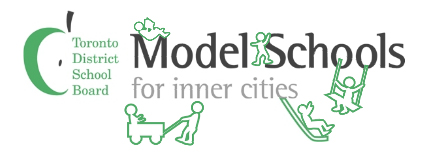
General Crerar Public School is proud to be part of the Model Schools for Inner Cities Program. Each Model School has the support of a Community Support Worker (CSW) who supports the parent community and a Teaching and Learning Coach who supports the teachers and students.
The Model Schools for Inner Cities Resource Team is committed to supporting school communities based on the Five Essential Components of a Model School.
The Five Essential Components of a Model School are:
1. Innovative Teaching and Learning practices
-
School Leaders: Learning Classroom Teachers
-
Professional Teaching & Learning Networks in Early Years, STEM and Mathematics
-
Model Schools Units for Grades 1-8
-
Summer School Program
-
Ontario Science Centre partnership
-
STEM (Science, Technology, Engineering and Math)
-
Early Years iPad initiative
2. Support Services to meet the social, emotional and physical well-being of students
http://www.tdsb.on.ca/Community/ModelSchoolsforInnerCities/Initiatives/SupportServices.aspx
-
Nutrition Programs
-
Eating breakfast impacts a student’s ability to learn and focus in the classroom. By packing a healthy lunch for your child, you ensure they can recharge and get through the day.
-
Vision and Hearing Testing
-
The Gift of Sight and Sound program provides vision and hearing screening for students in the Model Schools’ communities.
-
Partnerships
-
MSIC seeks to develop partnerships through large initiatives and with the local communities to collaboratively support student success. Some partnerships include Toronto Public Health, Toronto Public Library, Toronto Foundation for Student Success and Community Care Access Centre.
3. School as the heart of the community
-
Welcome to Kindergarten with The Learning Partnership
-
In the year before starting school, parents/caregivers and their children are invited to attend a Welcome to Kindergarten family orientation at their neighbourhood school.
-
Family Adventure Passport
-
This coupon book provides opportunities for students and their families to experience cultural and recreational activities throughout the city at a discounted rate.
-
Guide to Community Resources
-
We have put together a list of organizations and agencies to support students, families and communities. You will be able to find health and wellness, housing, education, financial and newcomer resources.
-
Parents Reaching Out Grants
-
Model Schools for Inner Cities collaborates with schools to identify potential project opportunities and to submit a proposal.
-
Cluster Parent Academy Committees(CPAC) and Parent Academy Conference
-
Parents are important partners in education and the Academies are designed by parents for parents to provide support to the school community. By being a part of your local Parent Academy, you can help determine which programs are best for your school community. CPAC meets once a month with parent school representatives to determine parent programs. Parent Academy Conference happens once a year with parents running workshops for other parents.
4. Research, review and evaluation of students and programs
-
Early Development Instrument
-
Kindergarten teachers complete the EDI to better understand a child’s readiness to learn at school.
-
Canadian Achievement Test (CAT4)
-
Each year, students from Grade 2 to 8 write the Canadian Achievement Test 4 to provide a valuable snapshot of students’ basic skills in reading, writing and mathematics. The results of CAT4 are shared with parents and schools.
-
Resiliency Initiatives Canada
-
Students in Grades 4-8 complete a resiliency survey which represents how successful students are in coping effectively with stressors.
-
Parents, Students and Staff Surveys
-
MSIC parents, students and staff participate in surveys which capture data about the school experience.
-
Interim Report for Principals
-
The Interim Report includes information on student demographic background, kindergarten students’ readiness for school, results from the EDI, student engagement, attitudes and skills, literacy scores, EQAO scores, CAT4 results, report card results, student/parent/ staff perception surveys and/or TDSB student/parent census data.
5. Commitment to share successful practices
-
Exploration Classroom
-
Exploration classrooms support teachers in learning from and with one another by engaging in co-teaching allowing for the student voice to be valued and respected.
-
International Visitors
-
Educators participate in an exchange of knowledge and practices between MSIC Schools and international programs/schools to learn from and with each other.
-
SharePoint
-
Teachers, Administrators and MSIC staff exchange information, share ideas and provide program feedback through an online portal.
-
Equity Continuum
- A tool that was created in partnership with The Centre for Urban Schooling (OISE), the equity continuum creates more equitable school experiences and success for all students by providing key areas and “look-fors” that guide educators during school and classroom equity walkthroughs.
TDSB: Model Schools for Inner Cities